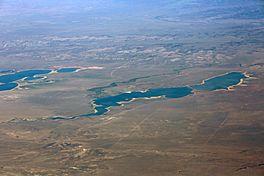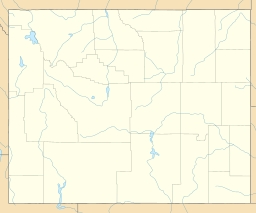Wheatland Reservoir facts for kids
Quick facts for kids Wheatland Reservoir |
|
|---|---|

The Wheatland Reservoirs, 2012
|
|
| Location | Albany / Platte counties, southwest of Wheatland, Wyoming |
| Coordinates | 42°00′00″N 105°02′02″W / 42.00000°N 105.03389°W 41°50′18″N 105°38′20″W / 41.83833°N 105.63889°W41°53′30″N 105°43′38″W / 41.89167°N 105.72722°W |
| Type | reservoir |
| Basin countries | United States |
Wheatland Reservoir is the name for three different man-made lakes in the state of Wyoming, USA. These lakes are called reservoirs. They are located near the town of Wheatland. Reservoirs are like big storage tanks for water. They help people manage water for things like farming or drinking.
Contents
Discovering the Wheatland Reservoirs
The Wheatland Reservoirs are an important part of the water system in Wyoming. They store water that comes from rivers and creeks. This stored water can then be used when it is needed, especially during dry times.
What is a Reservoir?
A reservoir is a large, artificial lake. It is created by building a dam across a river or stream. The dam holds back the water, forming a lake behind it. Reservoirs are built for many reasons. These include storing water for drinking, watering crops (irrigation), generating electricity, or controlling floods.
Wheatland Reservoir Number 1
Wheatland Reservoir Number 1 is the closest of the three reservoirs to the town of Wheatland. This reservoir was created by blocking a channel called Canal No. 3. This canal gets its water from Sybille Creek. Sybille Creek flows down from the eastern side of the Laramie Mountains.
Wheatland Reservoirs 2 and 3
Wheatland Reservoir Number 2 is located on the western side of the Laramie Mountains. This reservoir was formed by blocking the Laramie River. The Laramie River is a natural source of water for this area.
Wheatland Reservoir Number 3 is very close to Reservoir Number 2. It gets its water from two main sources. One source is a canal that brings water from Reservoir Number 2. The other source is also the Laramie River. These reservoirs work together to manage water resources in the region.
 | William M. Jackson |
 | Juan E. Gilbert |
 | Neil deGrasse Tyson |



